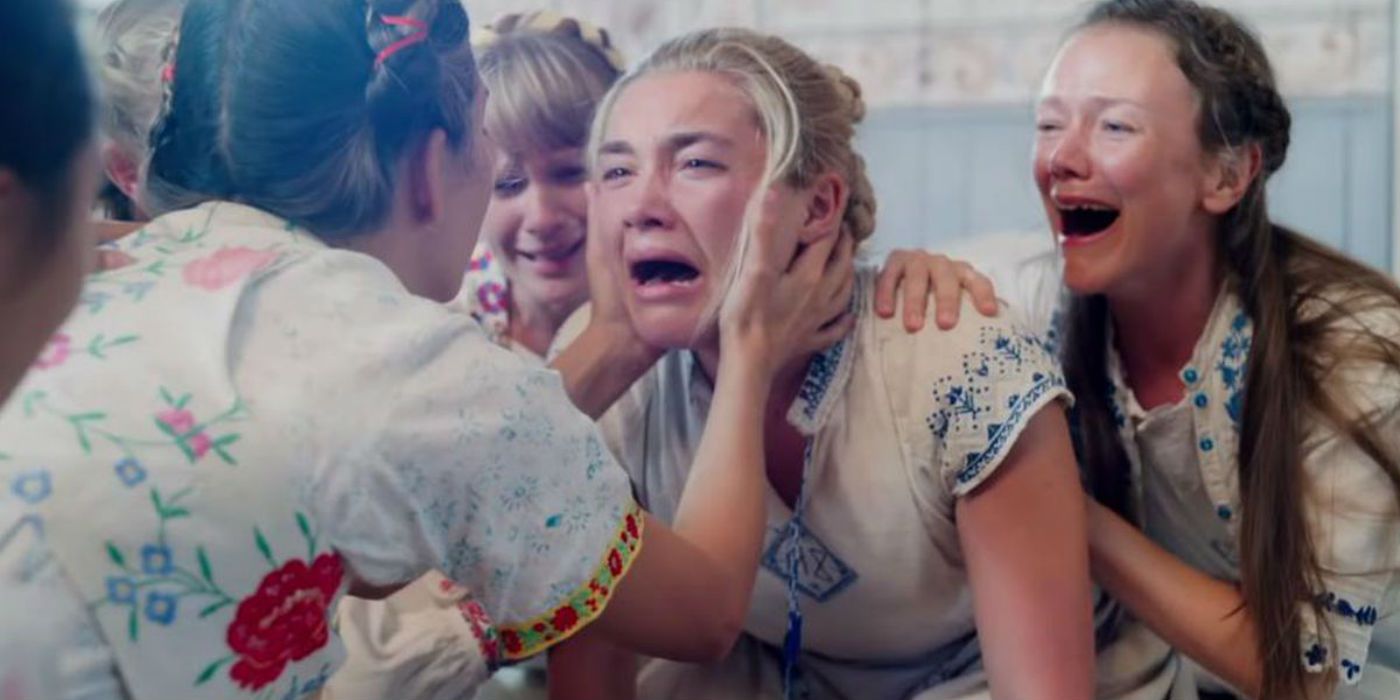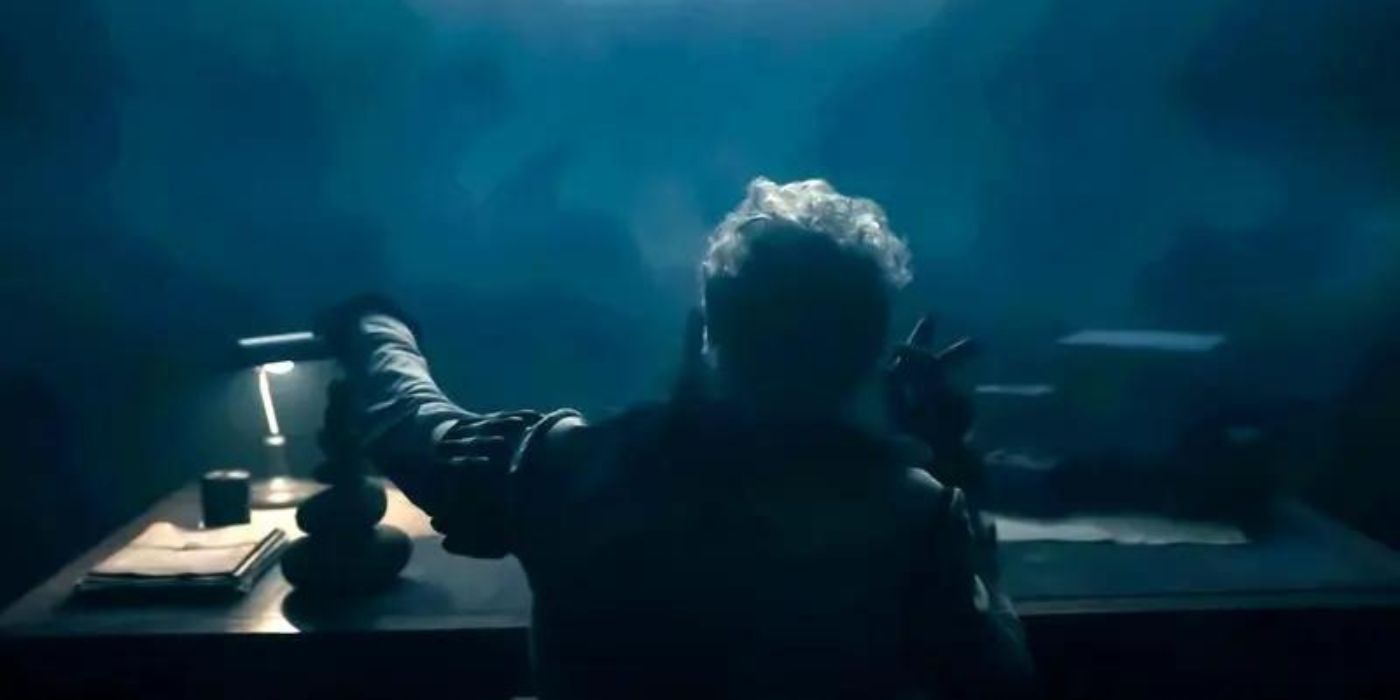Midsommar may be dividing audiences, but its reviews are overwhelmingly positive. Ari Aster’s much hyped follow-up to his breakout horror debut Hereditary has opened to a rave critical response. When it premiered at the 2018 Sundance Film Festival, Hereditary signaled the arrival of a fresh new voice in horror, and director Aster reaped the rewards of what was widely described as the year’s most terrifying movie.
His sophomore effort, Midsommar, is another horror title, but with a splash of black comedy for what Aster has billed as his “break-up movie“. The film follows Dani (Florence Pugh), a college student who has suffered from enormous tragedy. When her uncaring boyfriend Christian (Jack Reynor) tries to ditch her to attend a mysterious midsummer celebration in Sweden that only happens once every ninety years, she feels rejected, until he awkwardly invites her along with his dismissive friends (who include William Jackson Harper, aka Chidi from The Good Place). The strange festival includes hallucinogenic drugs, disturbing rituals, and sacrifices that have to be seen to be believed.
It was inevitable that any film Aster made to follow Hereditary would receive its fair share of attention, but the general consensus from critics is that he has managed to live up to the lofty expectations placed upon him. Midsommar has been billed as a blend of The Wicker Man, 1950s melodrama, Ken Russell surrealism, and extremely dark comedy. That blend of genres, plus Aster’s keen eye for visuals and his achingly well-considered craft, have made Midsommar one of the year’s most talked about films so far.

Much has been made about the supposed divide between critics and audiences when it comes to Aster’s work. Audiences polled by CinemaScore gave Midsommar a C+ grade, which is a step up from the D+ they gave Hereditary, although still on the divisive low end. The films’ advertising has been blamed, with many expecting more traditional horror experiences than Aster offers, but given that Hereditary made back almost ten times its $10 million budget, the hype is clearly still paying off in a big way.
Here are some of the most positive reviews for Midsommar:
Daily Telegraph (Tim Robey):
Think Midsommar, his much-hyped follow-up, looks like Aster’s answer to The Wicker Man? Well, it is, kind of – but that’s not to say you’ll come anywhere near predicting its singular, warped response […] Sick but also beautiful, the film gets away with an impressively audacious running time, simply because it can. It dazzles you with dread.
L.A. Times (Justin Chang):
If you think you can guess what’s coming next — various logistical nightmares, tetchy “bros before hos” arguments that erupt into screaming matches — you are in for the first of a few carefully doled-out surprises. In Pugh’s quietly astonishing performance, the sheer intensity of Dani’s grief, even when hidden behind a reassuring “I’m fine” smile, is palpable enough to keep the others on relatively good behavior.
Slate (Sam Adams):
If Hereditary was about being trapped, Midsommar is about the terror of being let loose, the giddy, sickening rush of freefall. You laugh at its audacity, or maybe just to keep from losing your own grip on reality. By the time it’s over, you can’t wait for night to fall.
The Ringer (Lindsay Zoladz):
Through the force of her complex, engrossing performance, Pugh brings Dani’s many ambiguities to light. As she did in her 2016 breakout film Lady Macbeth, the 23-year-old British actress creates a character so humane and likable at first glance that it’s disorienting when you realize she is still capable of unspeakable things. Grounded by the realism of Dani and Christian’s relationship, Midsommar has a way of making the customs of modern American heterosexual relationships seem almost as absurd as the Harga’s courtship rituals.
Boston Globe (Ty Burr):
Ari Aster’s steady, unnerving horror mystery takes place in northern Sweden around the summer solstice, which means that the lights almost never go out and night hardly ever falls. By the final scenes, a viewer might be as dizzy and disoriented as the characters. More original in its details than its concept and broad outline, the movie’s still memorably creepy — a poisoned ice pop for the coming dog days.

But not every critic has been won over by the ritualistic horror of Midsommar‘s relationship drama. For some, the extreme gore and body horror was tiresome and the basic concept too familiar to those with a passing knowledge of the horror genre. While the performances, especially that of Florence Pugh, have been universally acclaimed, the execution of the narrative left some critics wanting. Here are some excerpts from less glowing reviews of Midsommar.
Globe and Mail (John Semley):
Midsommar musters no such productive uncertainty of feeling, nothing in the way of genuine horror. There is only cruelty and coldness, draped in billowy peasant gowns and wreathed in radiant garlands.
Toronto Star (Peter Howell):
Midsommar is a horror movie for people who have lived idyllic lives free of horror movies. What few scares it possesses relies on the gullibility of the audience and the fortuitous casting of Lady Macbeth’s Florence Pugh, as the college naïf about to be gruesomely schooled. Writer/director Ari Aster shamelessly pilfers from previous terror shows, in particular The Wicker Man, Robin Hardy’s 1973 classic of communal intrigue. Aster doesn’t just telegraph the beats of his derivative tale; he rockets them like Scud missiles, perhaps hoping to bludgeon our senses and avoid detection.
Chicago Reader (Ben Sachs):
As a director Aster has only a few tricks up his sleeve, the most prominent being a slow Steadicam shot meant to instill an air of dread into the scene no matter what’s happening. This device, familiar from numerous recent American horror films (not just Hereditary), has been losing its power for years, yet Aster employs it in nearly every scene of Midsommar. Beyond suggesting a failure of imagination, the monotonous aesthetic works against its own intentions, calling attention to its own hollow artistry instead of any suspense inherent in the drama. The drama comes across as hollow too, as Aster simply bangs away on the grief theme he established in Hereditary; this suggests it’s the only way he knows how to access his characters’ feelings.
These reviews are in the minority, however, and while it hasn’t been as rapturously received as Hereditary, Midsommar has only strengthened Ari Aster’s reputation as one of the most exciting voices in horror of this decade. Expect less scares but way more disturbing imagery and you’ll be set for Midsommar.





